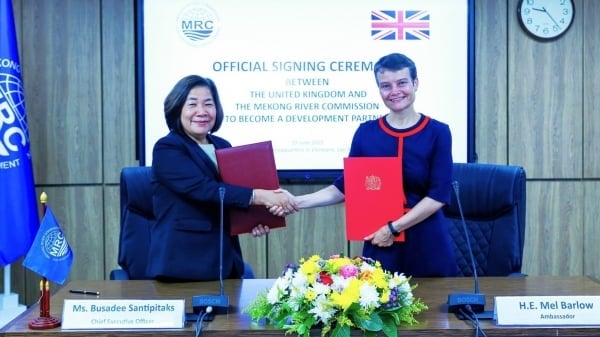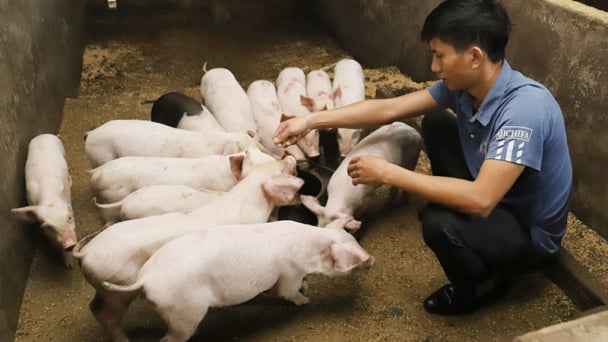June 21, 2025 | 01:31 GMT +7
June 21, 2025 | 01:31 GMT +7
Hotline: 0913.378.918
June 21, 2025 | 01:31 GMT +7
Hotline: 0913.378.918

The conference on developing the domestic market for Vietnamese agricultural products was held in person and online on the afternoon of May 5 at the Department of Agricultural Product Processing and Market Development (MARD). Photo: Tung Dinh.
Mr. Nguyn Quoc Toan, Director of AgroTrade, commented that domestic trade is a link between production and consumption, orienting and guiding domestic production to develop in accordance with market signals and contributing to the implementation of the "Vietnamese people to use Vietnamese goods" movement.
Therefore, it is vital to pay attention to policies with regard to the development of small and medium-sized businesses and to establish favorable conditions for economic households, cooperation groups, and cooperatives to join the market. In addition, it is necessary to promote trade forms based on new technologies and digitization, since e-commerce is a crucial tool for modernizing trade.
Nguyen Quoc Toan's goal for the development of the domestic market for agricultural goods is the diversification of agricultural consumption via contemporary distribution methods, e-commerce, and the promotion and encouragement of the construction of Vietnamese agricultural brands.

Cooperatives need to diversify distribution channels for their products. Photo: Tung Dinh.
Mr. Toan stated that in order to achieve this objective, it is necessary to reform and diversify methods of conducting business with domestic agricultural products, promote the formation and development of supply chains and value chains for domestic agricultural products, and develop synchronous and modern agricultural trade infrastructure.
In addition, it is important to renew the promotion of domestic trade in agricultural products and to restructure the agricultural sector's state management of agricultural commerce.
The AgroTrade representative said that agricultural cooperatives are a solution for agricultural transformation and that only cooperatives can escape the "fragmented, tiny, and spontaneous" curse.
However, the growth of agricultural cooperatives in Vietnam has several obstacles, such as small size, few members, inadequate administrative qualifications, a lack of capital, insufficient market information, and a limited approach to technology.
In the future, cooperatives will prosper rapidly and sustainably, adhering to the principle of voluntarism, originating from the needs and benefits of participants, including individuals and organizations with multiple forms of connectivity, and engaging in diverse cooperation to maximize the benefits of regions and areas.
In addition, attaching production and business to the product value chain and providing concrete contributions to economic, cultural, and social growth, environmental conservation, and development of a friendly and civilized society, particularly in rural regions.

The image of Vietnamese agricultural products and packaging also needs to be improved to attract domestic consumers. Photo: Tung Dinh.
Nonetheless, the growth of the collective economy and cooperatives must be based primarily on the organization's internal resources. The State develops and perfects institutions and policies to support and stimulate the development of collective economic, cooperative models...
In addition, it is vital to gain experience, implement successful domestic and foreign models with flexibility and efficiency, and enhance productivity, quality, efficiency, and competitiveness.
In addition, Toan proposed that cooperatives should strengthen their communication and promotion of the appearance of agricultural products, providing information on plans to stimulate demand for agricultural products of each unit so that MARD can develop plans to collaborate, coordinate, and inform local departments.
Coordination must be enhanced between cooperatives and distribution and consuming units in order to disseminate norms for the introduction of goods into distribution channels and systems. In addition, organizing information on the requirements of each supermarket chain in terms of varieties, packaging, standards, etc., so that the Ministry of Agriculture and Rural Development may share data with locals in order to guide production.
In the past, a lot of businesses have invested in agricultural and rural regions and originally predicted favorable outcomes. Vietnam's agricultural production lines have steadily adapted to high-market demands and integrated into global value chains.
Despite this, the growth of medium-sized firms engaged in agricultural value chains seems to be hampered by factors such as the attitude to social dynamics, land assessment, and information, among others.
Poor connections exist between medium and small firms. According to the Asian Development Bank's Asian Development Outlook report, just 21 percent of Vietnamese small and medium-sized organizations presently engage in the global supply chain, compared to 30 percent of Thai and 46 percent of Malaysian small and medium-sized businesses.

The link between cooperatives and businesses and associations will be the basis to enhance the consumption ability of agricultural products in the domestic market. Photo: Tung Dinh.
Consequently, it is essential to maintain enhancing institutions, policies, and laws. This collection of solutions intends to considerably enhance the business environment, maximize market participation convenience for companies, and provide a variety of solutions that directly support the growth of businesses. Small and medium-sized businesses are involved in the production, processing, and consumption of agricultural goods.
In addition, it is vital to establish regulations that support and encourage businesses to engage in production, processing, and consumption chains for agricultural goods.
For enterprises, it is necessary to identify their own advantages in terms of production and business conditions, market scope, customers, etc. in order to concentrate on development investment, avoid spreading investment and follow the trend to improve high market competitiveness, particularly in high-end markets.
Identifying these advantages is much more crucial for agricultural goods in order to improve the product's competitiveness while lowering manufacturing costs.
Another option proposed by the delegates is the partnership and association between businesses in the same business group and industry, which is a good way to promote the roles and strengths of each organization and the whole group of goods while competing in the market.
According to Mr. Nguyen Quoc Toan, linking together requires not only a policy and a resource but also the voluntary participation of both the farmer and the store. Therefore, it is vital to have particular initiatives to accompany shops and cooperatives, to attract both parties.
Translated by Linh Linh
![Turning wind and rain into action: [10] Advancing accessible climate services for farmers](https://t.ex-cdn.com/nongnghiepmoitruong.vn/608w/files/linhnhp/2025/06/20/1911-z6704423696987_15fd32ffc26d590d204d520c9dac6786-nongnghiep-161854.jpg)
(VAN) Not only does it help farmers 'avoid droughts and rains,' the development of agricultural climate services also enhances their ability to proactively adapt to a rapidly changing climate.

(VAN) With international assistance, the harvesting of sargassum seaweed in Quang Ngai has become increasingly regulated, thereby safeguarding marine life and ensuring the stability of coastal communities' livelihoods.

(VAN) On June 19, the United Kingdom officially became a Development Partner of the Mekong River Commission.

(VAN) Biodiversity is being threatened by traditional remedies made from wildlife. Traditional medicine and humans must change to live in harmony with nature.

(VAN) Agrifood investment and finance solutions for people and the planet.

(VAN) Microplastic contamination has become pervasive in seafood, posing unprecedented challenges for food safety and marine ecosystems.

(VAN) Proactively using vaccines, combined with transport control and enhanced surveillance, is the only viable path toward biosecure and sustainable livestock production in Vietnam.